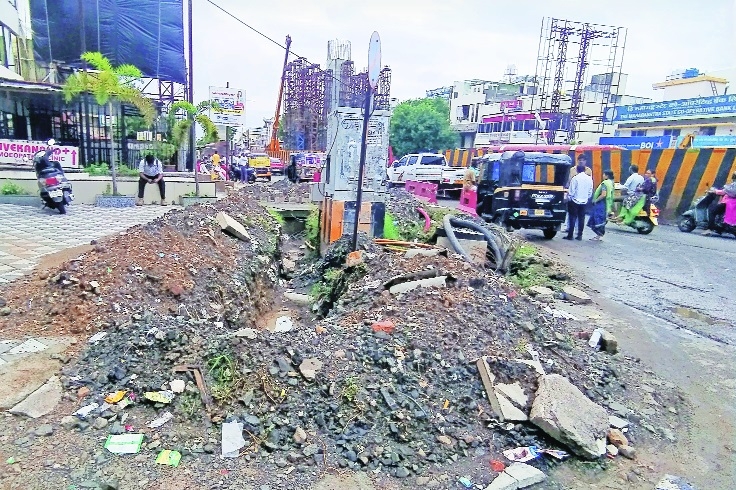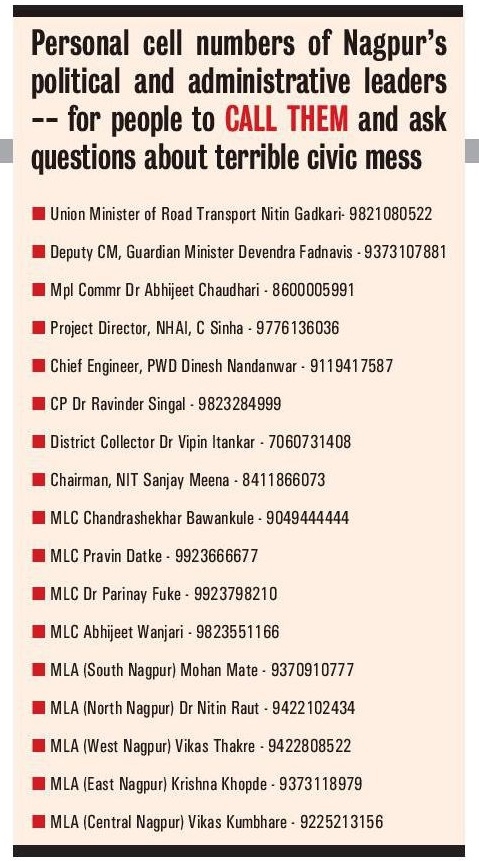Where is the stake-holder public in the civic process?
| Date :27-Jul-2024 |

Work of laying cables and pipeline has been going on for months at Dighori Square. The road is afflicted by construction activity for flyover months on end as well. This is one of the hundreds of spots of inconvenience dotting the city. (Pic by Satish Raut)
Thanks to political and administrative leaders ...
By Vijay Phanshikar :
Where has the stake-holder public been in the civic planning and decision-making process in the city of Nagpur, Maharashtra’s so-called Second Capital?
The answer is:
NO-WHERE !
Very easy it is to prove this assertion. Very easy it is to
prove that Nagpur’s political and administrative leaderships have decided to be deliberately deaf and dumb to the stake-holder public.
The evidence of this can be found strewn across almost every street, every nook and corner of the sprawling city that used to be dubbed as an “expanded village” until recently by visitors from metropolises. The evidence is in the form of terrible flooding of areas, thanks to unscientifically designed and arrogantly built roads. The evidence is in the form of dangerous water-logging even after a couple of hours of down-pour in many, many, many places in the city. The evidence is also found in the form of badly designed both-end approaches to the fly-overs, a relatively recent addition to the public infrastructure in the city. And the evidence is also found on the faces of the city’s political and administrative leaders who care a damn about the terrible inconvenience to the general public due to the terrible civic decision-making and implementation. The evidence is also available in the mounds of filth in countless numbers of places in the city.

The people’s outcry against ill-managed civic facilities and the media’s consistent coverage of the great inconvenience to which the people are treated due to bad civic management also form the body of evidence of ineptness and inefficiency of the city’s political and civic leaderships.
That was why the honourable Municipal Commissioner needed a lot of prodding to admit that badly-designed and shabbily constructed roads have been among the causes of flooding and water-logging.
To top it all, none of the city’s political leaders has risen from his or her slumber and responded positively to the public outcry in the past so many days. Yes, there were a couple of occasional press conferences etc just to acknowledge (though grudgingly) the presence of problems. But the promises made by Union Minister Nitin Gadkari and Deputy Chief Minister Devendra Fadnavis in the aftermath of last September’s flash floods have yet not been fulfilled.
There is one more evidence of the coldness of the city’s political and administrative leaderships. Even though the media in general and ‘The Hitavada’ in particular has been exposing the ills of civic management, not one single political leader or administrative leader has found it necessary to pick up the phone
and make a call and seek a serious interaction on civic issues.
This scribe has been raising different serious civic issues relentlessly for years, but not one single political or administrative leader ever got in touch with him to discuss details or present the official side of the story.
Unfortunately, the list of such persons includes Union Minister Nitin Gadkari and Maharashtra’s Deputy Chief Minister Devendra Fadnavis. The list also includes legislators of all political parties in the six Assembly Constituen-cies in the city and the rural neighbourhood at the
outskirts.
Implications can be many, so to say. One, the city’s political and administrative VIPs do not read newspapers -- so that they may ignore the outcry. Two, they do not feel responsible for the ills the city and its residents face due to their wrong decisions and wrong-doings. And three, they have nothing to do with people except seeking votes from them periodically. Once that goal is achieved, their connect with the people is over.
So, they don’t have to worry if the Editor is writing incisive pieces about civic mismanagement. And if the Editor is treated in this manner, it is easy to imagine what the status of common people must be in the heads and hearts of the political and administrative leaderships.
This scenario leads to a possible inference that all these people in positions of power once sat down together for a meeting and passed a resolution that they were not responsible for whatever may be happening in the city even due to their own misdeeds. And so, by implication, they are not accountable, too, for their own decisions and actions and failure to offer an efficient public service.
One more troubling question creeping into the heads and hearts of the common public is: Is Nagpur the State’s Second Capital -- or it is a second-class (or may be a third-class) capital of Maharashtra?
This brings us to the philosophical issue of a democratic polity and its implication to a community like the one available in Nagpur.
The issue, therefore, can be paraphrased thus: What is
the correct definition of a
democratic polity on the ground, and what is its practical manifestation?
For, if the electors -- who are described to be kings
in democracy -- or stake-
holders are kept so much
out of the process of decision-making or planning and implementation, then can
the system be described as democratic?
And then comes another natural extension of the
question: If the electors
have no place in the process, why should they exercise their franchise (in simpler words ‘vote’) in elections and get the unresponsive leaders for themselves?